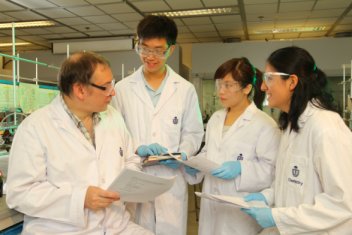Undergraduate Program Overview
The Four-Year Degree Curriculum (starting from 2012/13)
OUR CURRICULUM
The undergraduate program in Chemistry provides an excellent general training in analytical thinking and problem solving and prepares students for employment in area of chemical science, education and technology, chemistry related business, commodity markets, or further study in graduate research.
- provide flexible program structure, truly in credit based system which allows students to have credit transfer from other institutions or can be graduated in a faster track (3.5 years or 7 semesters);
- provide modular program structures that facilitate the pursuit of interdisciplinary curricula;
- focus on all round training, other subjects such as business, engineering, social sciences and humanities, languages and mathematics are included in the curriculum;
- focus on undergraduate research training;
- provide basic training in four major chemistry areas, i.e. analytical, inorganic, physical and organic chemistry;
- provide modern laboratory techniques and skill training;
- provide interdisciplinary laboratory techniques and skill training:
Combination of Organic and Inorganic laboratory - "Synthetic Laboratory"
Combination of Analytical and Physical laboratory - "Molecular Characterization Laboratory"
- provide advanced chemistry elective courses specialized in areas: Biomedical, Environmental and Nano/Materials;
- provide Enrichment Program, including international exchange program and Mainland Industrial Internship.


OPTIONS FOR YOU TO CHOOSE*
- Environmental and Analytical Chemistry
- Biomolecular Chemistry
- Materials Chemistry
- Pure Chemistry
- Chemistry - more than 20 credits of free electives; freedom to choose courses of your own interest (from other departments)
*Student may opt to graduate with or without an option. Students who take an option MUST complete all requirements specified in addition to the major requirements.
SELECTION OF CHEMISTRY OPTIONS AND CAPSTONE PROJECTS
- Information Session on Chemistry Options and Capstone (ppt) (2021/22 cohort or after)
- Information Session on Chemistry Options and Capstone (ppt) (2020/21 cohort)
- Information Session on Chemistry Options and Capstone (video) (2020/21 cohort)
- Capstone Declaration Form
- Safety Course Pre-class Assignment
CAREER PROSPECTS
- Testing laboratories; food safety sector; environmental consulting firms; forensic science;
- Biotechnology sector; quality control sector; medical firms;
- Polymer and industrial sector; semi-conductor (Light emitting diode) industry; metal-plating industry;
- Teachers; researchers; lab technicians; lab managers;
- Sales manager; entrepreneurship
- Employer List (Please refer to the website of Dean of Students' Office Career Center)

INTENDED LEARNING OUTCOMES OF CHEMISTRY MAJOR STUDENTS
Upon graduation, students should be able to:
A. Chemistry Related Knowledge
- Recognize fundamentals of chemistry including structure, reactivity and properties of chemical substances, and the states of matter.
- Explain the essential facts, principles and theories across the four principal areas of chemistry, i.e. analytical, organic, inorganic and physical.
- Demonstrate awareness of chemical topics relevance to social and daily life such as environmental issues.
B. Chemistry Related Intellectual Skills
- Formulate and analyze a wide range of analytical and synthetic chemical problems by applying chemical principles.
- Analyze and interpret experimental data, critically assess data in literature and extract useful data from it.
- Carry out directed research by selecting appropriate topics and procedures, and presenting the results.
- View issues in chemistry with reference to the practices of the international scientific community.
C. Chemistry Related Practical Skills
- Assess and manage the risks of chemical substances and laboratory procedures by evaluating their potential impact on the environment.
- Conduct standard laboratory procedures involved in synthetic and instrumental work.
- Operate a range of chemical instrumentation with adequate hands-on experiences.
D. Transferable Skills
- Communicate effectively both orally and in writing with professionals and/or lay audience.
- Demonstrate information technology skills, especially in the areas of information retrieval, literature searching and use of library databases.
- Show self awareness, work independently and collaborate effectively with other people in a team.